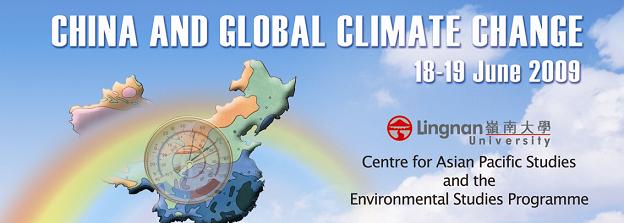
Event Title
Conference on China and Global Climate Change : Reconciling International Fairness and Protection of the Atmospheric Commons
Location
AM310, Lingnan University
Start Date
19-6-2009 9:00 AM
End Date
19-6-2009 10:30 AM
Language
English
Description
The Asia-Pacific Partnership on Clean Development and Climate [APP] of Australia, China, India, Japan, South Korea, USA and their new partner Canada is a new phenomenon in international climate policy and open for enlargement by other interested states. This nonlegally binding sustainable development Partnership connects climate protection and energy security for the first time in an international agreement. As a potential framework for the other 'parallel tracks' to the UN climate regime of Framework Convention on Climate Change [FCCC] and Kyoto Protocol [KP], the APP – which is still by far underfinanced – at its core is a political agreement for the development and transfer of environmentally-sound technologies. The Partnership intends only relative emission reductions and contains no binding emission reduction commitments.
Officially, the APP is consistent with the principles of the FCCC and intended to complement but not replace the KP. Nevertheless, the APP is only one of the partnerships embodied already in the FCCC technology framework and, therefore, no complement. The APP was intended as an opposing model against the KP and will have to clarify its position for the future. A fruitful cooperation or at least a peaceful coexistence with the UN climate regime is important because every technology-orientated approach needs market incentives. Any international Post-2012 climate change regime will have to combine the as yet competing approaches of market pull (KP) and technology push (APP). Integrating also climate change and energy security concerns is especially important for Asia as a region with a strong economic growth and the APP is a forerunner in this. China plays an especially important role, of course.
The third ministerial meeting of the APP will take place in China in 2009.
Document Type
Discussion
Recommended Citation
Holtwisch, C. (2009). Asia-Pacific partnership on clean development and climate: China and international climate policy beyond Kyoto. In China and global climate change: Proceedings of the conference held at Lingnan University, Hong Kong, 18-19 June 2009 (pp. 342-350). Centre for Asian Pacific Studies and the Environmental Studies Programme, Lingnan University, Hong Kong.
Included in
Asia-Pacific partnership on clean development and climate : China and international climate policy beyond Kyoto
AM310, Lingnan University
The Asia-Pacific Partnership on Clean Development and Climate [APP] of Australia, China, India, Japan, South Korea, USA and their new partner Canada is a new phenomenon in international climate policy and open for enlargement by other interested states. This nonlegally binding sustainable development Partnership connects climate protection and energy security for the first time in an international agreement. As a potential framework for the other 'parallel tracks' to the UN climate regime of Framework Convention on Climate Change [FCCC] and Kyoto Protocol [KP], the APP – which is still by far underfinanced – at its core is a political agreement for the development and transfer of environmentally-sound technologies. The Partnership intends only relative emission reductions and contains no binding emission reduction commitments.
Officially, the APP is consistent with the principles of the FCCC and intended to complement but not replace the KP. Nevertheless, the APP is only one of the partnerships embodied already in the FCCC technology framework and, therefore, no complement. The APP was intended as an opposing model against the KP and will have to clarify its position for the future. A fruitful cooperation or at least a peaceful coexistence with the UN climate regime is important because every technology-orientated approach needs market incentives. Any international Post-2012 climate change regime will have to combine the as yet competing approaches of market pull (KP) and technology push (APP). Integrating also climate change and energy security concerns is especially important for Asia as a region with a strong economic growth and the APP is a forerunner in this. China plays an especially important role, of course.
The third ministerial meeting of the APP will take place in China in 2009.

